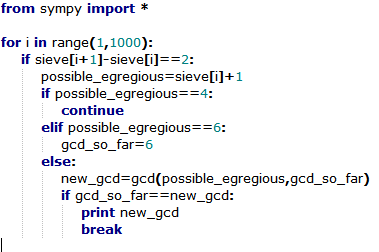Twin Prime Sandwich
An egregious number is an integer that is both one more than and one less than a prime number. For instance, 4 and 12 are egregious numbers. What is the highest common factor of all egregious numbers greater than 4?
The answer is 6.
This section requires Javascript.
You are seeing this because something didn't load right. We suggest you, (a) try
refreshing the page, (b) enabling javascript if it is disabled on your browser and,
finally, (c)
loading the
non-javascript version of this page
. We're sorry about the hassle.

Each egregious number is surrounded by two primes by definition
Therefore, we can denote said number by n, and we have a consecutive sequence of integers
n - 1, n, n + 1
where n -1 and n + 1 are prime
Note that neither n - 1 nor n + 1 can equal 2, as n - 1 = 2 implies n + 1 = 4, which is not prime, and n + 1 = 2 implies that n - 1 = 0, which is not prime
Also, n - 1 = 3 can be discounted as we stated n does not equal 4
And n + 1 = 3 can be discounted as it implies n - 1 = 1, which is not prime.
Therefore, neither n - 1 nor n + 1 can be divisible by 2 or 3, since a prime number is divisible by only 1 and itself and neither prime can equal 2 or 3
Considering three general consecutive integers, however, we note that one or two of them have to be divisible by two and exactly one of them has to be divisible by three
In this case, as neither prime number is divisible by either, clearly n is divisible by 2 and 3; thus we deduce that egregious numbers are all, except 4, divisible by 6
Noting that 6 is the first example of such a number greater than 4, the GCD/HCF must be 6